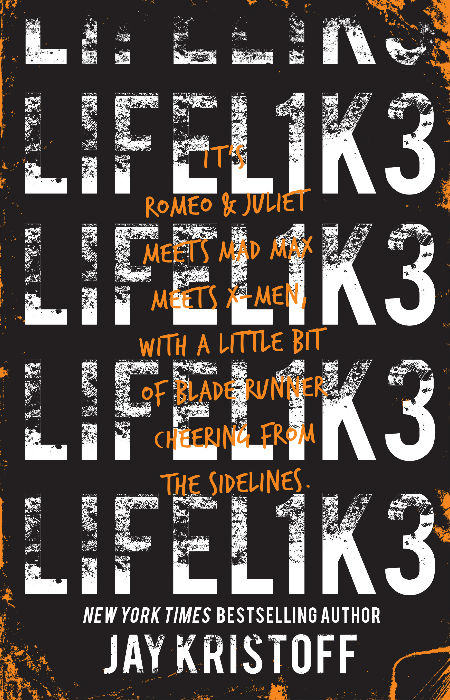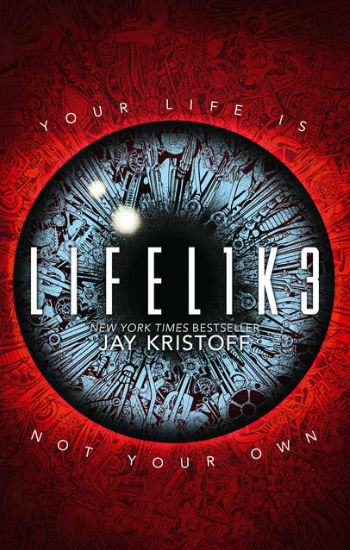
When the cover of a book proclaims it’s Romeo & Juliet meets Mad Max meets X-Men with a little bit of Blade Runner cheering from the headlines” it’s either got a healthy sense of what makes it work so well or its hopelessly derivative and is hoping that bringing up all its influences at the get-go will distract you from the messy mishmash to come.
Thankfully, Lifel1k3 by Jay Kristoff, is very much the former, undeniably influenced by the various plays and movies that it draws from but very much it’s own rabidly steampunky apocalyptic creation that swaggers and sways across the literary landscape with some gut punchingly good stops to smell the emotionally-resonant flowers along the way.
This my friends is how you write a superbly gripping futuristic techno-thriller with all the dystopian rusted bells-and-whistles in a postmodern, info-rich world where it’s damn near impossible not to be exposed to a myriad of other peoples’ already thought-out and expressed ideas.
Trying to be original in the midst of this been-there-done-there narrative glut is a challenge of epic proportions that has defeated many an author seeking to rise above the tumult and make a genre their own, but Jay Kristoff manages it with impressively gritty aplomb, and luxuriously rich and extrovertly-resonant writing, serving up an utterly-engrossing story that slams you in the face every bit as much as it tugs at your heartstrings.
“My mother send teams across the Glass, bringing back all they can find in the old world’s ruins and collecting them in Babel’s great library. Most of them already exist in our computer archives, but there’s nothing quite the same as sitting with a real book in your hands. Breathing in the ink and feeling all those wonderful lives beneath your fingertips. In between the pages, I’m an emperor. An adventurer. A warrior and a wanderer. In between the pages I’m not myself –and more myself than in any other place on earth.’ (PP. 123-124)
The story of Eve, a grubby 17-year-old robotics genius with a fauxhawk who lives in the Dregs, a down-at-heel lawless community on the now-island of Kalifornya, which itself sits across Zona Bay from the nuclear-glassed deserts that are all that remain of Arizona and New Mexico.
Her life is one of hardscrabble and loss, a constant quest to find the meds she needs to keep her cancer-stricken grandfather Silas alive, a stripped-back, the basics and nothing but the basics existence leavened and enriched by her can-do attitude, the undying friendship of her bestest Lemon Fresh (she was abandoned in a box of laundry detergent as a baby) and the protection of a small robot known as Logika called Cricket who has a snappy way with witty, put-you-in-your-place comebacks.
In the dog-eat-dog world that has eventuated from War 4.0 – yes, even conflict has gone digital in a future that is both more advanced and more feudally backward than our own – you need all the friends and allies you can get, especially when you’re pursued by the likes of the puritanical ranks of the Brotherhood who rather futilely, and hatefully, disseminate a gospel of genetic purity in an age when the atmosphere is tissue-thin and people are regularly baked to mutational breaking-point by the unrelenting UV rays it now admits, and bounty hunters such as the cyborg relentlessness than is the Preacher.
Kristoff’s grimly-imagined apocalyptic landscape, brought alive with glorious ferocity by an author with a gift for rapid and expansively-pleasing worldbuilding, is one festering with humanity vs. robot agitation, environmental collapse – animals are largely a thing of the past and plants exist in very small, threatened populations – enmity for your fellow human, and a prevailing sense that life is worth very little.

And yet, for all this woe, and the ever-present sensation that you could tumble off the existential abyss at any time, Eve is oddly happy.
Not giddily so since that’s well near impossible state of being in this blighted age, but as happy as you can be when your grandfather could die at any time, local street gangs are racing you to get to valuable salvage, your massive fighting robots is trounced in Roman-esque gladiatorial combat, someone wants your head for a bounty and you may just have the psychic ability to blow machines apart.
Right, so not so much happy as not dead, but until one terrible day, the worst day she’s ever had in fact, Eve is as content as anyone dangling off the edge of this mortal coil can be.
That one day though throws everything Eve ever knew into freefall, and as memories begin to seep in that suggest there is more to her past than she can remember, including the presence of a “Lifelike” (robots so close to being human that, perfect looks aside, they almost are) called Ezekiel, she is forced on the run with her ragtag family, unsure of who she really is, which of her memories are real (all of them? some? none?) and exactly where it is she’ll end up when all the madness is over.
If, of course, it is ever over.
As she and her beloved friends fight their way through rusted cities made of ships and cobbled-together, and twisting towers of steel and glass, and across nuclear wastelands of crystallised nothingness, Eve finds herself awash in a plethora of existential dilemmas, titanic battles for her soul and physical body and a gnawing sense that whoever she is, it’s a long, nightmarishly-exhausting way from who she once was.
“She thought of Ezekiel. Of Lemon. She wished she’d had a chance to try to make it right between her and them. Beneath the fury and the hurt, a part of her still loved them both. But it was like she’d told Raph that day in the library, she realized. It was only in fairy tales that everything turned out for the best.
Most people didn’t get a happy ending in real life.” (P. 363)
The brilliance and joy of Lifel1k3 is that Kristoff serves up a novel that is both bombastically action-oriented by deeply soulful and considered; it’s as if Michael Bay and George Miller met an earnest thoughtful indie film begetting a masterfully-engaging mix of full-speed ahead, bone-jarringly battles for survival with a stop-and-smell-the-flowers-and-wonder-why-they’re-there-at-all knowingness that works incredibly well every freaking step of the way.
This is the apocalypse with everything you’ve come to expect but with substance, thoughtfulness and a great big red heart on its sleeve that is, rather ironically, hidden in many ways until twist piles revelation, curtain-pullback alongside dazzling uncovering, in a messy game of life reveals that tests Eve’s sanity, sense of self and emotional cohesiveness.
If you want an apocalyptic novel that is accessible and heartfelt, possessed of wit, insight and an exhilaratingly, joyously affecting way with words, that creates a sense of visceral place both physically and emotionally, that puts the pedal to the metal (at one time literally) while asking a host of necessary questions that get you thinking even as you are ducking for cover from all kinds of narrative volleys, Lifel1k3 is your book, the best thing you’ll read now, or maybe in a messy, nasty but hopefully redemptive future.